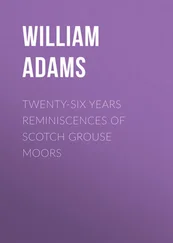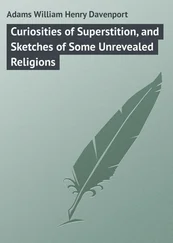William Adams - Witch, Warlock, and Magician
Здесь есть возможность читать онлайн «William Adams - Witch, Warlock, and Magician» — ознакомительный отрывок электронной книги совершенно бесплатно, а после прочтения отрывка купить полную версию. В некоторых случаях можно слушать аудио, скачать через торрент в формате fb2 и присутствует краткое содержание. Жанр: foreign_prose, foreign_language, на английском языке. Описание произведения, (предисловие) а так же отзывы посетителей доступны на портале библиотеки ЛибКат.
- Название:Witch, Warlock, and Magician
- Автор:
- Жанр:
- Год:неизвестен
- ISBN:нет данных
- Рейтинг книги:3 / 5. Голосов: 1
-
Избранное:Добавить в избранное
- Отзывы:
-
Ваша оценка:
- 60
- 1
- 2
- 3
- 4
- 5
Witch, Warlock, and Magician: краткое содержание, описание и аннотация
Предлагаем к чтению аннотацию, описание, краткое содержание или предисловие (зависит от того, что написал сам автор книги «Witch, Warlock, and Magician»). Если вы не нашли необходимую информацию о книге — напишите в комментариях, мы постараемся отыскать её.
Witch, Warlock, and Magician — читать онлайн ознакомительный отрывок
Ниже представлен текст книги, разбитый по страницам. Система сохранения места последней прочитанной страницы, позволяет с удобством читать онлайн бесплатно книгу «Witch, Warlock, and Magician», без необходимости каждый раз заново искать на чём Вы остановились. Поставьте закладку, и сможете в любой момент перейти на страницу, на которой закончили чтение.
Интервал:
Закладка:
5. Grind it in a wooden mortar, reducing it to powder; put this powder into a glass retort, and pour upon it the spirit of wine (see No. 1) till it stands about three finger-breadths above the powder. Seal the retort hermetically, and expose it to a very gentle heat for seventy-four hours, shaking it several times a day; then distil with a gentle heat, and the spirit of wine will pass over, together with spirit of mercury. Keep this liquid in a well-stoppered bottle, lest it should evaporate. More spirit of wine is to be poured upon the residual salt, and after digestion must be distilled off, as before; and this operation must be repeated until all the salt is dissolved and given off with the spirit of wine. A great work will then have been accomplished! For the mercury, having to some extent been rendered volatile, will gradually become fit to receive the tincture of gold and silver. Now return thanks to God, who has hitherto crowned your wonderful work with success. Nor is this wonderful work enveloped in Cimmerian darkness; it is clearer than the sun, though preceding writers have sought to impose upon us with parables, hieroglyphs, fables, and enigmas.
6. Take this mercurial spirit, which contains our magical steel in its belly ( sic ), and put it into a glass retort, to which a receiver must be well and carefully adjusted; draw off the spirit by a very gentle heat, and in the bottom of the retort will remain the quintessence or soul of mercury. This is to be sublimed by applying a stronger heat to the retort that it may become volatile, as all the philosophers affirm:
‘Si fixum solvas faciesque volare solutum,
Et volucrum figas faciet te vivere tutum.’
This is our luna , our fountain, in which ‘the king’ and ‘the queen’ may bathe. Preserve this precious quintessence of mercury, which is exceedingly volatile, in a well-closed vessel for further use.
8. Let us now proceed to the production of common gold, which we shall communicate clearly and distinctly, without digression or obscurity, in order that from this common gold we may obtain our philosophical gold, just as from common mercury we have obtained, by the foregoing processes, philosophical mercury. In the name of God, then, take common gold, purified in the usual way by antimony, and reduce it into small grains, which must be washed with salt and vinegar until they are quite pure. Take one part of this gold, and pour on it three parts of the quintessence of mercury: as philosophers reckon from seven to ten, so do we also reckon our number as philosophical, and begin with three and one. Let them be married together, like husband and wife, to produce children of their own kind, and you will see the common gold sink and plainly dissolve. Now the marriage is consummated; and two things are converted into one. Thus the philosophical sulphur is at hand, as the philosophers say: ‘The sulphur being dissolved, the stone is at hand.’ Take then, in the name of God, our philosophical vessel, in which the king and queen embrace each other as in a bedchamber, and leave it till the water is converted into earth; then peace is concluded between the water and the fire – then the elements no longer possess anything contrary to each other – because, when the elements are converted into earth, they cease to be antagonistic; for in earth all elements are at rest. The philosophers say: ‘When you shall see the water coagulate, believe that your knowledge is true, and that all your operations are truly philosophical.’ Our gold is no longer common, but philosophical, through the processes it has undergone: at first, it was exceedingly ‘fixed’ ( fixum ); then exceedingly volatile; and again, exceedingly fixed: the entire science depends upon the change of the elements. The gold, at first a metal, is now a sulphur, capable of converting all metals into its own sulphur. And our tincture is wholly converted into sulphur, which possesses the energy of curing every disease; this is our universal medicine against all the most deplorable ills of the human body. Therefore, return infinite thanks to Almighty God for all the good things which He hath bestowed upon us.
9. In this great work of ours, two methods of fermentation and projection are wanting, without which the uninitiated will not readily follow out our process. The mode of fermentation: Of the sulphur already described take one part, and project it upon three parts of very pure gold fused in a furnace. In a moment you will see the gold, by the force of the sulphur, converted into a red sulphur of an inferior quality to the primary sulphur. Take one part of this, and project it upon three parts of fused gold; the whole will again be converted into a sulphur or a fixable mass; mixing one part of this with three parts of gold, you will have a malleable and extensible metal. If you find it so, it is well; if not, add more sulphur, and it will again pass into a state of sulphur. Now our sulphur will sufficiently be fermented, or our medicine brought into a metallic nature.
10. The method of projection is this: Take of the fermented sulphur one part, and project it upon two parts of mercury, heated in a crucible, and you will have a perfect metal; if its colour be not sufficiently deep, fuse it again, and add more fermented sulphur, and thus it will gain colour. If it become frangible, add a sufficient quantity of mercury, and it will be perfect.
Thus, friend, you have a description of the universal medicine, not only for curing diseases and prolonging life, but also for transmuting all metals into gold. Give thanks, therefore, to Almighty God, who, taking pity on human calamities, hath at last revealed this inestimable treasure, and made it known for the common benefit of all.
Such is the jargon with which these so-called philosophers imposed upon their dupes, and, to some extent perhaps, upon themselves. As Dr. Thomson points out, the philosopher’s stone prepared by this elaborate process could hardly have been anything else than an amalgam of gold . Chloride of gold it could not have contained, because such a preparation, instead of acting medicinally, would have proved a most virulent poison. Of course, amalgam of gold, if projected into melted lead or tin, and afterwards cupellated, would leave a portion of gold – that is, exactly the amount which existed previously in the amalgam . Impostors may, therefore, have availed themselves of it to persuade the credulous that it was really the philosopher’s stone; but the alchemists who prepared the amalgam must have known that it contained gold. 1 1 Cf. Stahl, ‘Fundamenta Chimiæ,’ cap. ‘De Lapide Philosophorum’; and Kircher, ‘Mundus Subterraneus.’
It is well known that the mediæval magicians, necromancers, conjurers – call them by what name you will – who adopted alchemy as an instrument of imposition, and by no means in the spirit of philosophical inquiry and research which had characterized their predecessors, resorted to various ingenious devices in order to maintain their hold upon their victims. Sometimes they made use of crucibles with false bottoms – at the real bottom they concealed a portion of oxide of gold or silver covered with powdered sulphur, which had been rendered adhesive by a little gummed water or wax. When heat was applied the false bottom melted away, and the oxide of gold or silver eventually appeared as the product of the operation at the bottom of the crucible. Sometimes they made a hole in a lump of charcoal, and filling it with oxide of gold or silver, stopped up the orifice with wax; or they soaked charcoal in a solution of these metals; or they stirred the mixture in the crucible with hollow rods, containing oxide of gold or silver, closed up at the bottom with wax. A faithful representation of the stratagems to which the pseudo-alchemist resorted, that his dupes might not recover too soon from their delusion, is furnished by Ben Jonson in his comedy of ‘The Alchemist,’ and his masque of ‘Mercury vindicated from the Alchemists.’ The dramatist was thoroughly conversant with the technicalities of the pretended science, and also with the deceptions of its professors. In the masque he puts into the mouth of Mercury an indignant protest:
Читать дальшеИнтервал:
Закладка:
Похожие книги на «Witch, Warlock, and Magician»
Представляем Вашему вниманию похожие книги на «Witch, Warlock, and Magician» списком для выбора. Мы отобрали схожую по названию и смыслу литературу в надежде предоставить читателям больше вариантов отыскать новые, интересные, ещё непрочитанные произведения.
Обсуждение, отзывы о книге «Witch, Warlock, and Magician» и просто собственные мнения читателей. Оставьте ваши комментарии, напишите, что Вы думаете о произведении, его смысле или главных героях. Укажите что конкретно понравилось, а что нет, и почему Вы так считаете.











